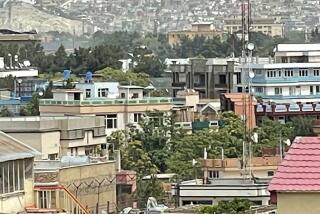Look who’s coming to dinner
- Share via
THE WAR ON TERROR BEGAN not as a fuzzy, open-ended concept but as a U.S. military offensive against two specific entities: Al Qaeda and the Taliban. Almost exactly five years ago, President Bush promised to drive them “from place to place until there is no refuge,” and he warned that “any nation that continues to
harbor or support” terrorist organizations “will be regarded by the United States as a hostile regime.”
Tonight, the president will host a dinner for the heads of the two nations, Afghanistan and Pakistan, that harbor the most fighters from Al Qaeda and the Taliban. Yet these are not hostile regimes; they are important U.S. allies. In fact, if there’s any hostility, it’s between their presidents, Hamid Karzai of Afghanistan and Pervez Musharraf of Pakistan, who have spent the last few days blaming each other for the Taliban’s resurgence. Both men have a case.
Karzai’s government has been losing control of Afghanistan’s southern and eastern provinces, where an estimated 4,000 Taliban loyalists are operating. Suicide bombings are up -- including one Tuesday that killed 18 people -- and NATO forces in the country have suffered more fatalities in 2006 (about 150, including more than 30 this month) than they did from 2001 to 2003. When Musharraf says that Karzai doesn’t know what’s going on in his own country and that the Taliban problem “lies in Afghanistan,” he has a point.
He’s also trying to change the subject. Musharraf raised hackles around the world this month by signing a truce with tribal extremists on the Afghan border, essentially withdrawing Pakistan’s security presence there in exchange for a promise to cease cross-border raids and reduce the influence of the Taliban there. Karzai slammed the deal as creating “terrorist sanctuaries,” while Musharraf defended it as a “holistic approach” to fighting terrorism.
Where does Bush stand on all this? Not with the most confidence-inspiring of testimonials. When Musharraf “looks me in the eye and says the tribal deal is intended to reject the Talibanization of the people, and that there won’t be a Taliban and won’t be Al Qaeda,” the president said, “I believe him, you know?”
Bush’s famously personal approach to diplomacy hasn’t always worked out -- the last leader into whose eyes he gazed, Russian President Vladimir V. Putin, has not turned out to be a reliable ally of the U.S. or of democracy -- and it will be tested tonight. Somewhere between Karzai’s and Musharraf’s competing versions of the truth, and within the borders of the lands they nominally control, lie the leaders of the Taliban and Al Qaeda -- the original enemies in this war.
Maybe Bush can trade on his friendships with Karzai and Musharraf to come up with a coordinated plan to fight the Taliban and reduce its havens in Afghanistan and Pakistan. Otherwise, he will have to explain how those countries can continue to harbor terrorists yet not be considered hostile regimes.
More to Read
Sign up for Essential California
The most important California stories and recommendations in your inbox every morning.
You may occasionally receive promotional content from the Los Angeles Times.










